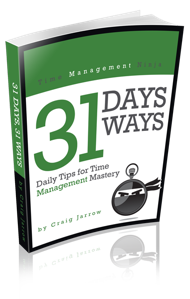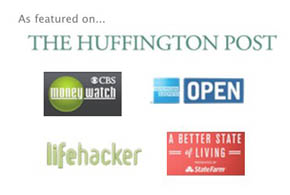
How many times will you check email today?
Probably, so many times that you’ll lose track.
However, checking your email more often doesn’t make you more productive. In fact, it prevents you from getting your work done.
What would happen if you only checked your email twice today?
Twice a Day Will Do It
Unless you are a customer service representative, email is not your job.
To reclaim your time, you need to stop checking your email 37 times a day.
Otherwise, you’ll find yourself endlessly reading and answering trivial messages all day long.
“Stop playing the email game. Do your work instead.” (Tweet this Quote)
So, how often should you check your email?
I recommend twice a day. Once early in the morning and once in the late afternoon.
Yes, initially you will continue to get people asking, “Did you get the email I sent you 5 minutes ago?”
Not checking your email every few minutes is not about being insensitive, rude, or disrespectful. Rather, it is about being productive, getting work done, and not playing silly email games.
By checking it less, you will set expectations for others that you are busy, however, you will get back to them soon. If they need you immediately, they can call, text, or come see you.
So, when should you check your email?
Check Email in the Morning
Check your email in the early morning to get ahead of the game.
Note, I did not say first thing. But, rather early in the AM. I do not check email until after I have gotten my morning routine done. (Planning, writing, preparation, etc.)
Checking email in the early AM it allows you to:
- Be a Step Ahead of Others – Sending your email messages out early gets you ahead of the game. Your email messages will be on top of inboxes when others get to work.
- Address Anything Still in Your Inbox – If anything is lurking in your inbox, you can get it done before the work day starts. This also allows you to catch up to those working off hours who may have sent you messages.
- Prevent Email Surprises – Checking email early prevents surprises. It gives you time to react to the important email that someone sent you that probably should have been a phone call.
- Get Delegations Out Early – If you need to pass something to a team member, the best time to do it is first thing, so that you are not holding up a task or piece of information. Checking email early prevents you from being a bottleneck in the team’s productivity.
- Respond to Others – If others are waiting on you for a response, getting them an early answer will make sure they have the response they need when they arrive at work.
- Get Tasks Out Of Your Inbox – Getting your inbox cleared out before you start your day is empowering. It gets you started with a spring in your step. Make sure you get those tasks out of your inbox and onto your todo list.
Checking your email early in the morning lets you get your day started right.
Check Email at the End of Day
Checking your email at the end of the day is important to closing open items and responding to inquiries.
To qualify this, this email check should be before the end of your work day. It should not be before you go to bed.
You also need to leave enough time to react to anything that may be waiting for you in your inbox. So, leave enough time at the end of the day to process your inbox.
Checking email at the end of the work day enables you to:
- Close Loops – Checking your mail near the end of the day lets you follow-up on unfinished tasks. Maybe something you needed to address or perhaps something you delegated.
- Leaves Time to React – If something still needs to be done, you still have time to act before your work day is over.
- Respond to Inquiries – Get back to those that emailed you today. By responding before the end of the workday, you will be responding within a few hours for most emails. If an email needs an immediate answer, call the person back rather than emailing.
- Plan for Tomorrow – Addressing your email from the day lets you plan for tomorrow. Do you need to set up some project time or schedule a follow-up meeting? Get the time scheduled today, so you are not rushing to set up something last-minute.
- End Your Workday – Emptying your inbox at the end of the day lets you finish your day with a sense of accomplishment and awareness. You don’t have to worry about what’s hiding in your email. Close up your email so that you can leave it at work.
Checking your email late in the day allows you to address open items and brings closure to your day.
Check Your Email Less
If you think you can’t check your email only two times a day, then try cutting back in steps, until you check it less and less.
You’ll discover that email does not need to be an immediate communication method.
You don’t need to sit at your desk monitoring your inbox. You don’t need to check email at lunch, in the elevator, or in the bathroom.
Soon, you’ll be getting your work done instead of constantly treading water in your inbox.
Question: How often do you check email? Could you check it only twice a day? You can leave a comment by clicking here. I am the author of Time Management Ninja and help individuals and companies reclaim their time to be more productive. As well, I am the author of the book
I am the author of Time Management Ninja and help individuals and companies reclaim their time to be more productive. As well, I am the author of the book 

Personnaly, I check my emails when i arrive at work and at 12am. But the most difficult thing is not to setup this workflow, it is to teach the others that your work like this. Especially for the sales guys who send you an email for a meeting starting in just 5 minutes or do not well understand that is no so easy after all to pick up emails under the shower at 6am
Very true… I got burned this AM by a meeting cancellation that was sent out 30 minutes before the scheduled time.
I check my email at most twice a day, pretty much at the same times each day. I used to get notifications when new emails came in but that was more distracting than helpful.
~Lea
Well, I totally agree, just wish I could say I was successful at this. I have managed to get rid of notifications so I’m at least not distracted. I will at times turn my email client off if I really need to focus, but for the most part I still need to make this a habit. Great post!
Turning off the notifications is a great start. 🙂
Unfortunately, I have to check my email about 4 times a day six days a week, but only because I can’t convince my boss that he shouldn’t rely on me to respond to every message within 4 hours.
However, I actually disagree with you on checking email early in the morning. I generally try to wait until 10:00am, and that’s with a 4:00 rise (early risers unite!). I find that knocking out a few big tasks in the morning is a whole lot easier if I do it before checking my mail.
So I try to get done some reading, some writing (if I’m writing that day), and ideally some mission-critical items before subjecting myself to the whims of my inbox. That way, no matter what comes up to sidetrack me, the whole day will have been a productive one even if I don’t get anything else done after opening my email.
Thanks for the great post! Email is a much bigger deal than most people think. (I recently had a friend tell me what a difference the 4HWW email suggestions had made for him.)
I agree with not checking it first thing. I tend to work on my priorities first and then later get to my inbox.
This is a really interesting concept. I tend to leave my gmail tab open and constantly check it, which will throw me off track from the things I need to get done. I’m going to test this out for a week and see how it changes.
Our company, Less Meeting – http://www.lessmeeting.com tends to be pretty good at reducing both meetings and email, so this is a concept I’m going to introduce to our whole organization.
Doesn’t work for me. I document important calls all day long by email. I also use email rather than calling as much as possible. So, I am in email periodically all day.
Also when I am out, which is often, I frequently have waiting time I can use to read and respond to email.
In addition, I started riding transit to town when I can. This is also a perfect opportunity to do business by email.
I agree that when working on a project you should not interrupt it to check email. I try not to, but the temptation is very great.
CLT
Ok I like this in theory and the past few weeks I’ve spent the first hour of my day at my desk on my most important task and that has been very effective for me. However what trips me up the rest of the day is when I need to send an email to a co-worker or employee and then I get sucked in. Is there an “off line” way of handling these messages?
I’m right there with you and would love to hear people’s thoughts on this – a lot of items on my to do list involve sending emails to clients, however it’s so hard not to get sucked in and side-tracked once my inbox is opened.
Darn it, I just wrote a long comment but it’s gone when I logged in to Disqus. Anyway, thank you for your post. I will try this. But I was just wondering, do you have your email logged in on your mobile phones? Cause even if you turned off the notification/sound, you’d still get that little envelope icon at the top of the screen, right? I don’t like seeing that and I just have to check the email when I see it.
At what time of the day do you do other online-related things such as doing online research, responding to Facebook page messages or twitter mention or instagram?
Always copy comment before logging in. 🙂
Hello! There is already a sound notification that you have received an email. A quick read will let you know if it’s important or not. On the other hand, why will I send an email to you if it’s not important. I need a reply FAST!
Excellent article, it’s surprising how much can be done if you don’t waste time on checking emails so often.
Here are 24 more productivity hacks everyone can use in their daily work – https://www.imindq.com/blog/best-productivity-tools
Very true… I got burned this AM by a meeting cancellation that was sent out 30 minutes before the scheduled time.
The first offender on my list was how frequently you check your email. … you feel like you’ve done a lot of work.
I check my email at most twice a day, pretty much at the same times each day. I used to get notifications when new emails came in but that was more distracting than helpful.
msphynxkitty kittens near me with ease ,Before adopting a sphynxkitty kittens you have a sphynxkitty kittens pricz. please visit our site:
https://sphynxkitty.company.com
msphynxkitty kittens near me with ease ,Before adopting a sphynxkitty kittens you have a sphynxkitty kittens pricz. please visit our site:
https://sphynxkitty.company.com
How Do I Get My Email
How Do I Get My Email
How Do I Get My Email
But back to the job in hand, I said “I don’t want to hear I love you, I’m sorry or anything, I just want to use your dirty cum filled cunt. You just lay back and enjoy, but while you do think very very clearly about what happens when I’m done. Because we are going to have a talk and if your 100 honest and hide nothing, we have a chance, but anything short of that and we are done, OK?” She nodded her understanding, what a picture she was, her mouth bulging with lace, hair all over the place, covered in sweat and god knows what else.